| Listing 1 - 10 of 16 | << page >> |
Sort by
|
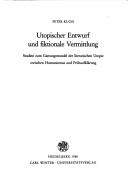
ISBN: 3533038505 3533038513 9783533038504 Year: 1986 Volume: 66 Publisher: Heidelberg: Winter,
Abstract | Keywords | Export | Availability | Bookmark
 Loading...
Loading...Choose an application
- Reference Manager
- EndNote
- RefWorks (Direct export to RefWorks)
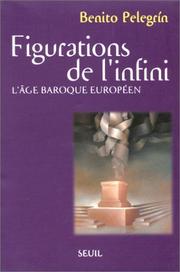
ISBN: 2020147017 9782020147019 Year: 2000 Publisher: Paris: Seuil,
Abstract | Keywords | Export | Availability | Bookmark
 Loading...
Loading...Choose an application
- Reference Manager
- EndNote
- RefWorks (Direct export to RefWorks)
European literature --- Baroque literature --- Civilization, Baroque. --- Littérature européenne --- Littérature baroque --- Civilisation baroque --- History and criticism. --- Histoire et critique --- Littérature européenne --- Littérature baroque --- European literature - 17th century - History and criticism. --- Baroque literature - History and criticism.
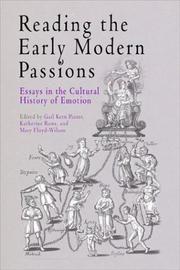
ISBN: 0812218728 0812237609 9780812218725 9780812237603 Year: 2004 Publisher: Philadelphia: University of Pennsylvania press,
Abstract | Keywords | Export | Availability | Bookmark
 Loading...
Loading...Choose an application
- Reference Manager
- EndNote
- RefWorks (Direct export to RefWorks)
History of civilization --- Literature --- anno 1400-1499 --- anno 1500-1599 --- European literature --- Emotions in literature --- History and criticism --- Emotions in literature. --- History and criticism. --- European literature - Renaissance, 1450-1600 - History and criticism --- European literature - 17th century - History and criticism
Book
ISBN: 272970616X 9782729706166 Year: 1999 Publisher: Lyon: Presses universitaires de Lyon,
Abstract | Keywords | Export | Availability | Bookmark
 Loading...
Loading...Choose an application
- Reference Manager
- EndNote
- RefWorks (Direct export to RefWorks)
Literature and history --- European literature --- History --- History and criticism --- Europe --- In literature --- Literature and history - Europe - History - 17th century - Congresses. --- European literature - 17th century - History and criticism - Congresses. --- Europe - In literature - Congresses.
Book
ISBN: 0300014856 9780300014853 Year: 1972 Publisher: New Haven (Conn.): Yale university press,
Abstract | Keywords | Export | Availability | Bookmark
 Loading...
Loading...Choose an application
- Reference Manager
- EndNote
- RefWorks (Direct export to RefWorks)
European literature --- Baroque literature --- Littérature européenne --- Littérature baroque --- History and criticism --- Histoire et critique --- History and criticism. --- Littérature européenne --- Littérature baroque --- Literature, Baroque --- -Literature, Baroque --- -European literature --- Comparative literature --- anno 1600-1699 --- European literature - 17th century - History and criticism --- Baroque literature - History and criticism --- LITTERATURE EUROPEENNE --- LITTERATURE BAROQUE --- 17E SIECLE --- HISTOIRE ET CRITIQUE
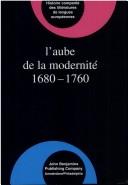
ISBN: 9789027234490 9027234493 1588111008 9786612161612 128216161X 9027297029 9789027297020 9781282161610 Year: 2002 Volume: 16 16 Publisher: Amsterdam ; Philadelphia : J. Benjamins,
Abstract | Keywords | Export | Availability | Bookmark
 Loading...
Loading...Choose an application
- Reference Manager
- EndNote
- RefWorks (Direct export to RefWorks)
The purpose of this collective work is to throw new light on a period which is defined, neither in historical, nor in ideological terms, but along specific literary criteria. Across the XVIIth and the XVIIIth century, a new perspective appears on the status of literature and its relation to the author. Literature overflows the traditional limits of the so called "belles lettres" and the classical rules inherited from the tradition. Starting with The battle of the books, or with the new psychology of Marivaux's comedies and journals, the way is paved for a new form of writing that will eventually promote a new kind of drama, rooted in real life, as well as a considerable extension of the realm of satiric inspiration. The famous "Querelle des Anciens et des Modernes" is a token of this profound change. While the prestige of the author is raised (as in Pope's case), the domain of literature is extended to the field of social and economic life, giving models and advice even on trivial and utilitarian matters. These trends are studied in a broad European perspective by a team of scholars coming from various horizons and cultures.
Histoire de la littérature --- --1680-1760 --- --European literature --- European literature --- History and criticism --- History and criticism. --- Littérature européenne --- Histoire et critique --- Literature - General --- Languages & Literatures --- European literature - 18th century - History and criticism --- European literature - 17th century - History and criticism --- Littérature européenne --- 17e siècle --- 18e siècle
Book
ISSN: 07604513 ISBN: 9791023105902 Year: 2018 Volume: 35 Publisher: Paris: Presses de l'Université Paris-Sorbonne,
Abstract | Keywords | Export | Availability | Bookmark
 Loading...
Loading...Choose an application
- Reference Manager
- EndNote
- RefWorks (Direct export to RefWorks)
Confrontés à l'émergence de la société de cour, telle que Norbert Élias l'a analysée, les auteurs hésitent entre fascination et dénonciation. Avec ironie et parfois cynisme, la poésie, les narrations, le théâtre dépeignent à la fois les attraits et les dangers de la vie curiale. À côté des traités qui enseignent comment réussir dans le monde, de Castiglione à Gracián, fleurit aussi une littérature de refus ou de la satire, qui vilipende les valeurs de la cour, fait l'éloge de la retraite ou appelle à la révolte. Bien des oeuvres sont traversées par ces postulations contradictoires, hésitant entre la recherche d'une morale adaptée aux contraintes sociales et la tentation de la fuite loin des cours corrompues et corruptrices. La publication en Espagne de l'ouvrage d'Antonio de Guevara, le "Mespris de la cour et l'éloge de la vie rustique" (1539), puis ses traductions à travers toute l'Europe, ont cristallisé un thème déjà très vivant dans la littérature antique puis médiévale : celui de la satire du milieu urbain, des sphères du pouvoir et de la cour, conjuguée à l'éloge d'une vie simple, "médiocre" et rustique. Cette topique morale et politique traverse ensuite toute la littérature et la philosophie politique, de la Renaissance à l'Âge classique.
European literature --- Courts and courtiers in literature --- Country life in literature --- History and criticism. --- History and criticism --- Courts and courtiers in literature. --- Country life in literature. --- Satire --- European literature - Renaissance, 1450-1600 - History and criticism. --- European literature - 17th century - History and criticism
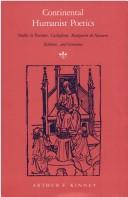
ISBN: 1122052693 0585193606 9780585193601 0870236652 9780870236655 9781122052696 Year: 1989 Publisher: Amherst (Mass.): University of Massachusetts press,
Abstract | Keywords | Export | Availability | Bookmark
 Loading...
Loading...Choose an application
- Reference Manager
- EndNote
- RefWorks (Direct export to RefWorks)
European literature --- Humanism in literature. --- Poetics --- Humanism in literature --- Humanists --- Languages & Literatures --- Literature - General --- Scholars --- History and criticism. --- History and criticism --- History --- Humanists. --- Poetics - History - 17th century --- Poetics - History - 16th century --- European literature - Renaissance, 1450-1600 - History and criticism --- European literature - 17th century - History and criticism
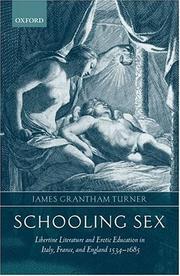
ISBN: 9780199254262 0199254265 Year: 2003 Publisher: Oxford: Oxford university press,
Abstract | Keywords | Export | Availability | Bookmark
 Loading...
Loading...Choose an application
- Reference Manager
- EndNote
- RefWorks (Direct export to RefWorks)
Erotic literature, French - History and criticism --- Erotic literature, English - History and criticism --- Erotic literature, Italian - History and criticism --- European literature - Renaissance, 1450-1600 - History and criticism --- European literature - 17th century - History and criticism --- Erotic literature, French --- Erotic literature, English --- Erotic literature, Italian --- European literature
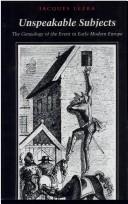
ISBN: 0804727783 Year: 1997 Publisher: Stanford, Calif. Stanford University Press
Abstract | Keywords | Export | Availability | Bookmark
 Loading...
Loading...Choose an application
- Reference Manager
- EndNote
- RefWorks (Direct export to RefWorks)
Descartes, René --- Cervantes Saavedra, Miguel de --- Shakespeare, William --- Descartes, Renâe, - 1596-1650. - Meditationes de prima philosophia. --- Cervantes Saavedra, Miguel de, - 1547-1616. - Don Quixote. --- Shakespeare, William, - 1564-1616. - Measure for measure. --- European literature - 16th century - History and criticism. --- European literature - 17th century - History and criticism. --- Historicism in literature.
| Listing 1 - 10 of 16 | << page >> |
Sort by
|

 Search
Search Feedback
Feedback About UniCat
About UniCat  Help
Help News
News